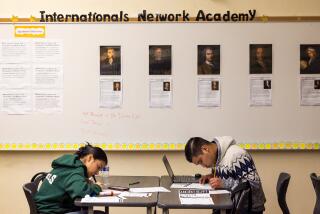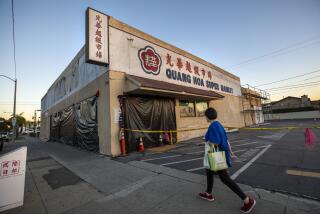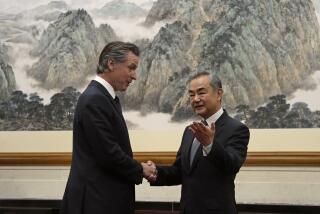Diane E. Long helps California boost exports to China
- Share via
The gig: Diane E. Long, a veteran member of China’s expatriate business community, became executive director of the new California-China Office of Trade and Investment on Nov. 1. Her mission is helping boost the Golden State’s exports to the world’s second-largest economy, now about $14 billion a year.
“Our focus is to help our small and medium-sized enterprises feel comfortable and to expand their international options,” Long said in a telephone interview from her Shanghai office. “That is the way we’re going to grow.”
Long’s job is to help California entrepreneurs new to Asia make contacts and navigate the cultural, government and economic challenges of doing business in China.
The office, formally opened in April during an Asian trade mission led by Gov. Jerry Brown, is a public-private partnership between the California government and the Bay Area Council, a business organization based in San Francisco. According to the council, Long, for now, is the only permanent staffer at the Shanghai office.
Before China: Long is a native Californian who has lived many places in the state, from Red Bluff in the north to Ventura in the south. She graduated from Stanford University in 1980 with a degree in international affairs. Her first jobs in the Bay Area and Ventura County involved global trade.
Language study: After a couple of years working in the United States, Long made a life-altering decision.
“I decided I needed an Asian language,” she said. “I did some research and thought Chinese was the best opportunity for the future. I started to study Chinese and realized that I needed to be put in a situation where I’d learn it faster than I was learning in a night-school program.”
Far East beckons: Long moved to China in 1985 as part of Stanford’s Volunteers in Asia program. She taught English and studied Mandarin Chinese and immersed herself in the language, culture and history of the people of a vast nation that was starting to emerge on the world stage.
She recalled the period as an exciting and tumultuous time in the country, after the United States and China normalized their relations and new Chinese leadership undertook a series of economic reforms. “They basically had to clear out a lot of old thinking and bring the country out of poverty,” she said.
Alone in Anhui: As a volunteer, Long first lived for two years in Anhui province west of Shanghai. “In those days, it was very isolated without the Internet and a mobile phone,” she said. “One didn’t know what was happening in the rest of the country.”
At the beginning of her stay, Long had to confront the shock of realizing she was especially isolated because she couldn’t speak Mandarin.
“The ‘aha!’ moment was when I realized that after so many years of school and a very good education, that I was illiterate,” she said. “That was an astounding moment as I stood there on a street and couldn’t read anything. It forced me to focus on learning the language and learning how to read.”
Career climbing: After acquiring a working knowledge of Mandarin, Long was hired by a small Shanghai apparel firm, the first of many positions of increasing responsibility in the clothes export business. She went on to be an executive with UBS International, a Chinese consulting firm; Liz Claiborne; and Xanadu Enterprise Shanghai, a bilingual, bicultural company that helps foreign firms enter the Chinese market.
In the meantime, she married another international executive, a Shanghai businessman she declined to identify by name. She has three sons, ages 19, 13 and 10.
Biggest challenge: “It’s keeping up with the changes because the country doesn’t stop evolving,” Long said.
At the same time, however, many aspects of daily life have become far easier than when she arrived in China 28 years ago. “It used to be a lot more difficult to live here,” she said. “I used to have to carry empty suitcases out to load up with basic needs, like dishwashing soap and diapers for my children,” she said. “But now it gets easier every day.”
Twitter: @MarcLifsher
More to Read
Inside the business of entertainment
The Wide Shot brings you news, analysis and insights on everything from streaming wars to production — and what it all means for the future.
You may occasionally receive promotional content from the Los Angeles Times.










